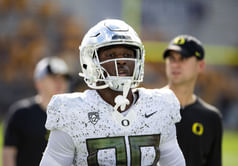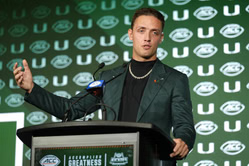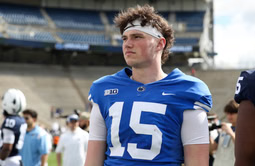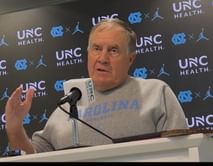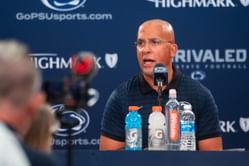
College football coaches play a pivotal role in the success and development of their teams. These individuals are not just strategists but leaders who mold young athletes, fostering teamwork, discipline, and skill enhancement. Within the expansive landscape of college football, coaches hold distinct positions and responsibilities, each contributing uniquely to their team's journey.
List of College Football Coaches Roles and Positions
Head Coach
At the helm is the head coach, the primary decision-maker responsible for the team's overall direction. They develop game strategies, oversee player recruitment, manage staff, and serve as the face of the program.
Assistant Coaches
Assistant coaches specialize in offenses, defense, special teams, or specific player positions. They work closely with players, refining techniques and implementing the head coach's strategies.
Coordinators
Offensive and defensive coordinators are crucial, overseeing game plans, analyzing opponents' strategies, and ensuring their respective units perform optimally during games.
Position Coaches
These coaches concentrate on specific player positions, providing focused guidance and training tailored to individual roles within the team.
List of College Football Coaches: Top 20 Coaches for 2024
1. Kalen DeBoer, Alabama: Kalen DeBoer is the head coach of the Alabama Crimson Tide football team, he joined the role in 2024 following the retirement of Nick Saban. Kalen has been a head coach of the Washington Huskies and Fresno State Bulldogs football teams. For his outstanding coaching, he has received several head coaching awards throughout the years, specifically in 2023 he was honored with AP Coach of the Year (2023), Eddie Robinson Coach of the Year (2023), Home Depot Coach of the Year (2023), Sporting News Coach of the Year (2023), and Walter Camp Coach of the Year (2023).
2. Kirby Smart, Georgia: Smart's recent national championship victory, consistent NFL draft picks, and remarkable win-loss record solidify his status among the elite. His adeptness in molding the Bulldogs into a perennial powerhouse is undeniable.
3. Dabo Swinney, Clemson: Swinney's past success and sustained dominance in the ACC, although missing recent playoff appearances, testify to his coaching pedigree and program-building abilities. His record as a two-time national championship winner cements his coaching legacy.
4. Jim Harbaugh, Los Angeles Chargers: Harbaugh's successful turnaround at Michigan, highlighted by consecutive Big Ten championships and strategic use of the transfer portal, signifies his evolution in coaching. He coached the Michigan till 2023 and joined the Los Angeles Chargers in 2024.
5. Ryan Day, Ohio State: Despite occasional criticisms, Day's remarkable winning percentage, consistent playoff appearances, and NFL talent production underscore his coaching prowess. The quest for overcoming rivalries remains a focal point in the Buckeyes' journey.
6. Brian Kelly, LSU: Kelly's seamless transition to LSU, marked by an impressive first season and a consistent history of winning seasons, solidifies his stature among top-tier coaches. His ambitious goal of winning a national championship is well within reach.
7. Lincoln Riley, USC: Riley's immediate impact at USC and his previous successes in quarterback development place him among the elite coaches. However, questions regarding defensive strategies need to be addressed for continued success.
8. Luke Fickell, Wisconsin: Fickell's remarkable tenure at Cincinnati substantiated his coaching abilities and laid the groundwork for his transition to Wisconsin. His no-nonsense approach and proven track record position him favorably in the Big Ten landscape.
9. Kyle Whittingham, Utah: Whittingham's consistent success at Utah, marked by conference championships and sustained excellence, reinforces his underrated coaching prowess. His team's performance underscores their potential for continued success.
10. Josh Heupel, Tennessee: Despite inherited challenges, Heupel's impressive turnaround at Tennessee showcases his ability to create stability and attract top-tier recruits. His career-winning percentage underscores the sustained impact he's made on the team.
11. Sonny Dykes, TCU: Dykes' impactful debut season at TCU, culminating in a memorable CFP championship game run, reinforces his coaching prowess and ability to transform programs, marking a significant chapter in his coaching journey.
12. Mack Brown, North Carolina: Brown's coaching finesse, complemented by consecutive nine-win seasons and quarterback development, continues to elevate North Carolina's standing. His adaptability in the evolving landscape of college football solidifies his legacy.
13. James Franklin, Penn State: Franklin's fluctuations in recent seasons mirror the team's varying performances, albeit with an overall positive trend. However, his struggle against conference powerhouses highlights the need for breakthrough victories in the upcoming season.
14. Mike Elko, Texas A&M: Mike Elko joined the Texas A&M football team as a head coach in 2024 after the retirement of Jimbo Fisher who led the team from 2018 to 2023. Mike was the head coach of Duke where in his first season, the Blue Devils went 9–4 with a win in the Military Bowl.
15. Mike Gundy, Oklahoma State: Gundy's remarkable streak of winning seasons at Oklahoma State reinforces his ability to maximize the team's potential. While facing challenges in the latter part of the season, his consistent record reflects his coaching prowess in the ever-competitive Big 12.
16. Mark Stoops, Kentucky: Stoops' impressive track record at Kentucky, characterized by consistent bowl game appearances and enhanced talent development, underscores his influence in elevating the program's stature in the highly competitive SEC East.
17. Pat Narduzzi, Pitt: Narduzzi's commendable run with Pitt, including an ACC championship and consistent conference performances, highlights his emergence as a strong voice for his program and college football.
18. Chris Klieman, Kansas State: Klieman's ascent, crowned by a Big 12 championship season, illustrates his ability to integrate winning strategies from his time at North Dakota State into Kansas State. Managing increased expectations will be his upcoming challenge in the competitive Big 12.
19. Kirk Ferentz, Iowa: With a lengthy coaching tenure at Iowa, Ferentz faces heightened scrutiny. Despite offensive challenges, he led the team to victories and impactful acquisitions in the transfer portal, emphasizing the significance of the upcoming season for perception and team development.
20. Lane Kiffin, Ole Miss: Kiffin's consistent success, marked by multiple 10-win seasons, solidifies his position among the top coaches. Despite a few setbacks, his impact on the Ole Miss program is evident, although he faces the perennial challenge of proving himself in the competitive SEC West.
FAQs on College Football Coaches
A. Head coaches in college football stand out due to their strategic acumen, leadership skills, recruiting prowess, and ability to mold young athletes on and off the field. They must oversee the team's direction, manage staff, and serve as the program's face.
A. Both offensive and defensive coordinators are responsible for developing game plans, analyzing opponents' strategies, and ensuring optimal performance of their respective units during games. On the other hand, position coaches focus on specific player positions, providing individualized guidance and training tailored to those roles within the team.
A. College football coach rankings often consider a coach's overall win-loss record, championships won, success in recruiting and developing talent, conference or national titles, impact on program improvement, and adaptability to the evolving landscape of the sport.
A. College football coaches face challenges beyond on-field performance, including navigating recruiting complexities, managing team dynamics and discipline, adapting to NCAA rule changes, balancing academic and athletic commitments for student-athletes, and handling media and fan expectations while building a successful program.
